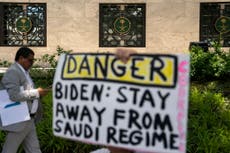Will Joe Biden’s trip to Saudi Arabia affect US gas prices?
Issue weighs on president as midterms approach
As Joe Biden embarked on a multi-issue mission to the Middle East, his first as president, one persistent problem for his administration was weighing heavily both on the minds of White House staff and the media: oil prices.
In recent days the issue of whether Mr Biden will directly call upon Saudi and Gulf leaders to ramp up production has become the latest example of the contradictory nature of the Biden White House press team. At the end of June the president stated directly that he would not ask regional leaders to increase production during a press conference in Madrid.
“No, I’m not going to ask them,” said Mr Biden on 30 June. “All the Gulf states are meeting. I’ve indicated to them that I thought they should be increasing oil production generically, not to the Saudi Arabia in particular. I hope we see them in their own interests concluding that makes sense to do.”
“That’s not the purpose of the trip,” the president added.
Yet days later his national security adviser Jake Sullivan would issue a statement declaring exactly the opposite from the White House lectern: “He intends to use every tool in his toolbox to ensure adequate global energy supply, and to get the price of gas down for American working families at the pump.”
He added that the Biden administration would work to “ensure” that it was having a “positive impact” on gas prices.
“We will convey our general view [during the trip to Saudi Arabia] ... that we believe that there needs to be adequate supply in the global market to protect the global economy and to protect the American consumer at the pump,” Mr Sullivan said.
Mr Biden wrote in an op-ed this week that Saudi Arabia’s government was “working with my experts to help stabilize oil markets with other OPEC producers”, while not mentioning if he would press the subject of global oil supply on the trip.
But a former US ambassador to the kingdom told The Independent in an interview on Thursday that Mr Biden’s goal is much broader than just seeking a surge in oil production. The president, Dr Joseph Westphal said, is trying to rebuild the relationship with Saudi Arabia that deteriorated during the Obama and Trump administrations in the hopes of preventing these kinds of shocks to the global supply in the future.
“I don't think he expects that Saudi Arabia will be able to increase oil production,” said Dr Westphal, who served during Mr Biden’s second term as vice president.
“Their excess capacity is pretty, pretty light right now. And they don't want to risk using it. So there's not much more they can they can pump at this time. And he knows that,” the former ambassador continued.
Mr Biden’s goal instead will be to persuade OPEC nations to work in greater collaboration with the west to avert future crunches, Dr Westphal concluded.
“I'm sure what he's what he's going to say is we need to work better together with OPEC to set supply and prices in the future for all of our economies,” he said.
There are, of course, a number of other issues beyond oil prices that Mr Biden is hoping to address during his meetings tomorrow and Saturday. The US in general is pushing for greater regional collaboration between Gulf nations on issues of security and trade, and hoping to build off of the success found by the Trump administration in its efforts to normalise relations between Israel and its neighbours. Mr Biden will become the first US president to fly directly from Israel to Jeddah, Saudi Arabia this week as part of that campaign.
Saudi Arabia, Dr Westphal told The Independent, has been eager to rebuild its relationship with the US even in the face of increased investment from Russia and China as he says the Kingdom still sees America as a more reliable partner.
But whether or not Mr Biden actually asks Saudi officials or their Gulf state counterparts to increase oil production may be a moot point for now, as gas prices began dropping shortly before the president embarked on his trip and are now making significant progress away from the historic highs they reached only weeks ago.
And the trend is likely to continue, experts say, for a multitude of reasons including signs of an economic slowdown in China and falling domestic gasoline demand in the United States.
The American Automobile Association’s (AAA) analysts noted in a blog post on Thursday that consumers “will likely continue to see price relief at the pump”.
“We expect oil prices to continue on a downward trajectory,” AAA’s manager for federal affairs Devin Gladden told The Independent in an interview, adding that the trend would likely continue through the remainder of the summer though he noted that demand could rise slightly around the Labor Day holiday.
Gas prices have dropped an average of seven cents nationwide since Monday, a sharp drop that has left the national mean price at $4.60 a gallon.
National Economic Council director Brian Deese told Yahoo! Finance in an interview on Wednesday that the Biden administration was doing everything it could to stabilise the global supply and was “acting urgently” to try to bring prices down further.
"From our perspective, we're focused on doing what we can to keep that dynamic [of falling prices] going. That's about increasing global supply. That's what the president was focused on with the G7 in trying to work toward what we refer to as a price cap on Russian oil. That would maintain stability in the global supply of oil while really focusing the economic pain on Vladimir Putin," he said.
Join our commenting forum
Join thought-provoking conversations, follow other Independent readers and see their replies
Comments


Bookmark popover
Removed from bookmarks